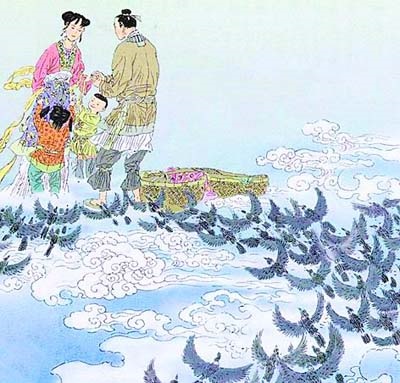Myths and Legends
(9) The Cowherd and the Weaver
Thousands of years ago, in rural China, a poor boy took care of a cow for a family. He began at age seven and was still doing same at age eighteen. His only name was Cowherd, and he and the cow were attached to each other.
One day the old cow spoke: “Dear master, you have been taking good care of me all these years. Now I am going to die soon. I should be happy to see you married and build a loving family. Go to the hill-top lake tomorrow, you will see seven fairies bathing there. The youngest one is the Weaver. Her robe is in sandy colour. Take it and she will not be able to go back to heaven. She will be a good wife for you.”
The Cowherd did as he was told. He hid the robe in a secret place marked by the cow. The Weaver became desperate without her robe. He consoled her and they became husband and wife.
Three years had gone by. The Weaver helped her husband built a house and opened up a small plot of land. Working together, they made an adequate life, and had a son and daughter born to them. Everything was going well.
One day, the old cow whispered to the Cowherd: “I will die in two day. Do not grieve badly because we all die. Please cut off my tail before burying me, dry it in the sun, and keep it as a belt. It might help you someday.” Again, the Cowherd did as told.
Meanwhile, the Weaver had always tried to find her lost robe. She found it inside a bush near the hill-top lake one day, screened by a wall of rocks. Overjoyed, she tried to put it on to see if it still fitted her.
To her horror, she floated up in the air the minute the robe was on. She called out loud to her husband for help because she did not want to leave.
Out in the field, the Cowherd heard and saw his wife up in the sky. He ran home to get the children together to chase her. A voice broke out from his cow-tail belt: “Take me as a shoulder pole to carry the children in baskets. I’ll fly you to catch her.”
They got near the Weaver. The children cried for their mother. The Weaver called back. Their cries were heartrending.
Up in heaven, the fairy sisters were watching. They missed the Weaver all those years and wished to have her back in their midst. They did not like her marriage and the Cowherd. As they saw the chase getting close one of them used her hairpin to draw a long line across the cosmic space.
A wide river appeared, sparkling with millions of stars as shining ripples. It divided the Weaver from her family. They stood on opposite banks, calling and weeping.
 Guanyin, the Goddess of Mercy saw the happening and felt for the couple. But she was not powerful enough to alter all celestial events. She decided to help the family meet once a year, on the seventh day of the seventh moon.
Guanyin, the Goddess of Mercy saw the happening and felt for the couple. But she was not powerful enough to alter all celestial events. She decided to help the family meet once a year, on the seventh day of the seventh moon.
On that date, she summoned all the magpies on earth to fly to the celestial river to form a bridge for the couple to meet. There, the parents and children would have a time together. They shed tears as they expressed their longings for one another, and their wish to be united again.
On earth, the Chinese, later also the Japanese, had since celebrated the Double Seven Festival (七夕) to remember the tragic event. At night, people would search the sky for the Celestial River, known as the Milky Way, and point to two bright stars with blinking eyes.
“There they are!” Someone would call out in excitement, “They are the Weaver and the Cowherd meeting and embracing!”
It is a custom that people in south China always collect water from the well and store it in an earthen urn placed in a shaded place. It would keep for many years. It is believed that the water drawn on that day represents the tears of the celestial lovers. Such Seven-Sister-Water has medicinal properties to ease fevers.
-------------------------------------------------------------------------
Note: This is a narration combining a number of descriptions on the subject in a number of books. It is a story loved by all, telling the love of gods and man and animals, all caring each other in simple life situations. The story had left us with a much celebrated festival in which members of families share their imagination and emotions on the interweaving of love, despair, sacrifice and courage in processes of sorrow and sweetness through fleeting time and space.

